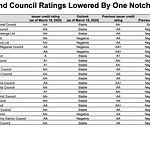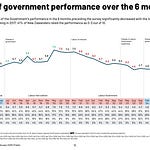TL;DR: The six things that stood out to me in Aotearoa’s political economy around housing, poverty and climate from the last day included:
A crescendo of opposition to the Government’s Fast Track Approvals Bill is growing beyond Parliament and including iwi, political columnists, editorial writers, legal scholars and campaigners who fear it gives three ministers more power than Robert Muldoon.
A previously secret list of the projects invited to use the bill shows many have already been rejected in courts or already face local opposition.
Even if it passes unscathed, the bill faces multiple legal challenges because opponents say it breaches other law such as the Zero Carbon Act and doesn’t comply with Te Tiriti.
Directions from Te Whatu Ora to staff show the Government’s budget cuts to pay for tax cuts are indeed hitting front line services, despite assurances that only back-offices would be affected.
Young renters are becoming more militant about rent increases and a lack of new housing supply across the developed world. The latest example is in Auckland where students have launched a rent strike against the Auckland University’s 8% rent hike last year.
PM Christopher Luxon is facing push-back from business leaders and foreign affairs experts to his description of Aotearoa-NZ having been ‘closed for business’ and his Government’s preference to join Aukus II.
(Paying subscribers can see more detail and analysis below the paywall and in the podcast above. We’ll open it up for public reading, listening and sharing if they give permission by getting over 100 likes. Update. Achievement unlocked)
Crescendo of opposition to fast-tracking powers is growing
Opposition to the Government using its Fast Track Approval Bill is growing beyond Parliament in the form of legal challenges, tribunal hearings, non-political campaigns and appeals to trading partners who have written environmental and climate provisions into our free trade deals.
Editorial writers, columnists, Parliamentary Commissioners who are often sympathetic to the Government are also lining up to criticise the bill as over-bearing, undemocratic, arrogant, reckless and inviting corruption.
Here’s three examples, starting with this column by Political Editor Claire Trevett in the NZ Herald-$$$, which is titled : Arrogance and patchy sales job is turning Fast Track Bill into a problem for National.
The fast-track legislation is rapidly shaping up as a problem for the government. If the National Party part of that coalition government fails this test, it risks setting the tone for the rest of the term.
“There are signs the government is getting arrogant about it. The overall tenor of the ministers involved has been one of “trust us, we know what we’re doing”.
Bishop’s statement that the public would get the ultimate say on it at the ballot box in 2026 was one example. Simply saying you won the election, ergo you can do it, will only take your core supporters with you.
One of the perils every new government faces is finding that balance between moving on the mandate you manage to get on election day – and taking the public with you.
It is easy to over-estimate that mandate. Even pre-advertised change needs a strong sales job once it is happening, especially if it is quick and fast.
The fast-track legislation was only partly advertised in advance, during the election campaign. It certainly wasn’t advertised in the form it has ended up, with massive power given to ministers to sign off on projects with little nod to public input. Column by Claire Trevett
There’s also this editorial in The Press-$$$ this morning, titled: The fast and the furious. Who gains from the new Fast-track Approvals Bill?
More legislation has been passed under urgency by this Government than any other in the MMP era, while the public service that might offer advice or input is being steadily reduced.
Such an approach does not just endanger the threatened environments that house the blind frogs and multicoloured skinks Jones enjoys making fun of, but something that is just as fragile and treasured, which is democracy itself.
One submission from a respected New Zealand political scientist warns of the potential for cronyism, “clientelism” and patronage if this bill becomes law. There will be “an incentive for private interests, organisations and investors to develop strong relationships with the government of the day”.
There will be much less transparency and a greater chance of conflicts of interest. Such a system will also favour those who can afford lobbyists and other means of accessing political power.
In short, it will make New Zealand less democratic. It is a use of emergency powers for a time without an emergency.
We saw a similar concentration of executive power during the Covid-19 pandemic, although those responses were temporary and less far-reaching. It will be intriguing to observe whether the critics who so loudly accused the previous government of “authoritarianism” and even tyranny over its Covid policies will see the Fast-track Approvals Bill in the same way. More legislation has been passed under urgency by this Government than any other in the MMP era, while the public service that might offer advice or input is being steadily reduced.
Such an approach does not just endanger the threatened environments that house the blind frogs and multicoloured skinks Jones enjoys making fun of, but something that is just as fragile and treasured, which is democracy itself.
One submission from a respected New Zealand political scientist warns of the potential for cronyism, “clientelism” and patronage if this bill becomes law. There will be “an incentive for private interests, organisations and investors to develop strong relationships with the government of the day”.
There will be much less transparency and a greater chance of conflicts of interest. Such a system will also favour those who can afford lobbyists and other means of accessing political power.
In short, it will make New Zealand less democratic. It is a use of emergency powers for a time without an emergency.
We saw a similar concentration of executive power during the Covid-19 pandemic, although those responses were temporary and less far-reaching. It will be intriguing to observe whether the critics who so loudly accused the previous government of “authoritarianism” and even tyranny over its Covid policies will see the Fast-track Approvals Bill in the same way. Editorial in The Press-$$$
Thirdly, here’s Parliamentary Commissioner for the Environment Simon Upton in his submission on the bill:
Getting stuff done and doing things differently should not mean discarding the need for high quality information and a clear understanding of the costs as well as the benefits of proposed activities. The Bill does nothing to improve the parlous state of environmental information that afflicts resource management processes and imposes so much cost. On the contrary, its solution appears to be to limit the opportunities for environmental scrutiny.
I consider that it poses significant risks to the environment for the following reasons:
The environment does not appear in the purpose clause (unlike its predecessor the COVID-19 Recovery (Fast-track Consenting) Act 2020) so environmental impacts will carry less weight than claimed developmental benefits;
The Minister for the Environment is excluded from being either a decision maker or being consulted as part of the processes;
The time needed to verify and test the accuracy and completeness of environmental information is limited and there is no requirement to record gaps in information or uncertainty alongside the claimed benefits of projects;
Ministers subject to political lobbying are empowered to allocate public resources with potentially harmful environmental and health consequences;
Currently prohibited activities and projects that have already been declined on environmental grounds are potentially eligible for fast-tracking;
Excluding those who wish to raise environmental concerns that are wider than those of immediate landowners means that most environmental questions will not be asked.
The Bill lacks many of the environmental safeguards its predecessor legislation contained. Even the much-maligned National Development Act 1979 had more environmental checks and balances. Parliamentary Commissioner for the Environment Simon Upton in his submission
Pick of the links elsewhere on this:
How three men get unprecedented power from a coalition bill RNZ Farah Hancock
Minister accused of 'gaslighting' over Fast Track questions RNZ Farah Hancock
Projects previously blocked put on fast-track list
Chris Bishop yesterday unveiled a list of mining and farming projects he suggested apply to use the Fast Track Approval Bill That included plans for an open-cast coal mine, the seabed mining of phosphate on the Chatham Rise and salmon farms in the Marlborough Sounds, all of which have already been rejected by the courts. Others who hadn’t been invited and who would have faced challenges in hearings and courts are applying, including a gold mine in Otago.
Charlie Mitchell reported for The Press-$$$ on the background to the applicants declared in the list in this piece titled: ‘Fast track’ letters sent to miners, irrigators, and property developersAmong the companies told how to apply for ‘fast track’ consent are some with projects previously rejected by the courts
Among them was Stevenson Mining, which had its plans for a mine at Mt Te Kuha near Westport scuttled by the Environment Court last year. The company recently withdrew its appeal of that decision, seemingly in the hopes of submitting for fast-track approval.
Another was Chatham Rock Phosphate, which has long sought to mine rock phosphate from the seabed on the Chatham Rise, east of the South Island. The EPA rejected a previous consent application to do so. Other recipients included King Salmon, which had a proposal to farm fish in parts of the Marlborough Sounds thwarted by the Supreme Court in 2014, and National Steel, which has faced controversy for its Christchurch scrapyard near the the Ōpāwaho/Heathcote River.
Letters also went to companies with significant projects on the books in the South Island.
They included Amuri Irrigation Company, which has sought to expand irrigation in the Hurunui District; Far North Solar Farm, which has proposed the country’s largest solar farm in the Mackenzie Basin; Southern Parallel Campus Limited, which has proposed an equestrian centre at Lake Hood near Ashburton; and Santana, which wants to mine for gold in Central Otago. Charlie Mitchell reporting for The Press-$$$
Debbie Jamieson has more detail in her report last night for The Southland Times, published in Stuff.
The backers of two proposed Central Otago gold mines are hoping to be included in fast tracking legislation, avoiding onerous planning processes. Hawkeswood Mining Ltd, which is seeking consent for a mine in Miller’s Flat, near Roxburgh, appears to be facing an uphill battle for consents following planner’s recommendations to decline applications before the Central Otago District and Otago regional councils.
Meanwhile, publicly listed Santana Minerals presented a scoping report to the Australian Stock Exchange that indicated it could make revenue of $4.4 billion over 10 years, at a gold mine at Bendigo, near Cromwell. Debbie Jamieson via Stuff
Pick of the links elsewhere on this:
Otago gold mine and controversial mineral sands project on 'fast-track' letter list. Australian miners Santana and Tiga on long list of businesses to receive advice on fast-track consents from minister.The Post-$$$ Tom Pullar Strecker
Mining activity undertaken without consent ODT-$$$ Matthew Littlewood
The campaigners are lawyering up
One feature of the response to the Fast Track Approvals Bill is the planning for legal challenges as soon as the bill passes, along with challenging it using other bills, including various Tiriti o Waitangi clauses and the Zero Carbon Act.
The apparent failure in the bill and in the selection of projects of any consideration of the climate effect could be problematic. Climate Change Minister Simon Watts admitted to 1News’ Felix Desmarais in answering a Parliamentary written question from Green Co-Leader Chloe Swarbrick to having not sought any advice from officials on the climate effects.
There are Tiriti issues too, as detailed in this 1News report by Te Aniwa Hurihanganui.
Unlike the Covid-19 Recovery (Fast-track Consenting) Act 2020 or the RMA, the legislation doesn't include a treaty principles clause.
"The bone-chilling part of it is that it excludes hapū and iwi from having a substantive role in decision-making within the system to protect the environment," said Environmental consultant Tina Porou.
"Te Tiriti is a constitutional document. I has to be in every layer, it is in every layer, and to think you can remove those rights just by a pen is naive."
Iwi around the country, including Waikato and Ngāi Tahu, have publicly declared concerns around the Government upholding its commitment to Te Tiriti o Waitangi and treaty settlements.
The Fast-track Approvals Bill does have an overarching Treaty clause requiring "all persons exercising functions to act in a manner that is consistent with existing Treaty of Waitangi settlements".
That means developers would be unable to seek fast-track approval to build on land returned to iwi as part of settlements. 1News Te Aniwa Hurihanganui.
Pick of the links elsewhere on Tiriti and environment issues:
‘Hypocritical and unfair’: Councils speak up on Māori wards plan. Stuff Karanama Ruru
Ministers accused of Cabinet Manual breach with threats to Waitangi Tribunal Newsroom Marc Daalder
Budget cuts hitting health frontlines
National assured voters that any cost-cutting to pay for tax cuts would not affect ‘frontline’ services. But it’s becoming clear the 6.5% and 7.5% cuts in departmental budgets demanded by Finance Minister Nicola Willis just before Christmas to help pay for Budget 2024’s tax cuts are indeed biting into frontline services.
This was clear in a letter from Te Whatu Ora management to staff, as cited in reports by RNZ’s Phil Pennington and Newshub’s Amelia Wade.
Te Whatu Ora orders staffing clampdown in bid to save money RNZ Phil Pennington
'Serious crisis': Health NZ directs hospitals to restrict roles, limit overtime in frontline freeze Newshub Amelia Wade
Pick of the links elsewhere in health, education & Government:
Push for govt screen rebate to fund Shortland Street RNZ
$12.1m already spent: Government storage facility project axed. The Department of Internal Affairs plan to build a storage facility in Levin has been cancelled Stuff George Heagney
Auckland students start rent strike
In a new sign of the activism brewing among young renters, Auckland University students have gone on a rent strike against an 8% increase last year.
Pick of the links elsewhere in housing and transport:
Almost 300% increase in demand for social housing in Taranaki Stuff
Heritage ruling could block housing project. The Christchurch City Council wants to keep the old cottage, but the Carter Group says it threatens its major housing development The Press-$$$ Liz McDonald
Column by Sam Stubbs: Are we building the wrong homes to address our housing crisis? Data shows 55% of New Zealanders living in homes with one or two residents. That makes one and two-bedroom apartments and townhouses the homes in the shortest supply across NZ The Post-$$$
Picton in limbo since Govt pulled pin on interisland ferry project Newshub Alexa Cook
The places where you're most likely to pass your driving test RNZ
Road-dominated $10b transport plan gets tick from Canterbury mayors RNZ
Luxon faces push-back on Foreign Affairs
Editorial by ODT-$$$ Aukus a step too far?
Cartoons of the day
Ka kite ano
Bernard Hickey
Editorial by The Press-$$$
Statement by Chris Bishop Beehive.govt.nz
Fast Track Approvals Bill Legislation.govt.nz
PMQ 7047 Parliament.nz





















In the late 1970s and early 80s Muldoon moved the country perilously close to a dictatorship by making all decisions through the Executive Council/Cabinet (who were terrified of challenging him), reducing the time Parliament was in session and making life very difficult for the media.
The Fast Track Approvals Bill and other fast-track legislative changes are making Muldoon look tame. Sir Geoffrey Palmer,who was instrumental in getting Parliamentary governance back on a democratic track, must be appalled. As are the rest of us.
Tēnā koe, Bernard.
This coalition government has one term written all over it, however election defeat will not be due to the Labour Party’s efforts but rather a surge in support for the Greens and Maori Party. I have never seen the support wheels come off a new government so quickly.
The opposition parties need to make clear, that any approvals under the new fast track legislation will be reversed after change of government without compensation to the applicants. Applicants will then proceed at their risk.
This "Fast Track" bill seems quite similar to the 1933 "Enabling" Bill the Nazis gave themselves to unleash the "Brownshirts" and what followed.
Owen Sharpe
Bernard please consider opening up this post, or post on Linked In, this is information people need to know. Thanks for your excellent journalism.
Please open this post Bernard. This is urgent.
ditto me
I am concerned at the constitutional implications of the bill but is enabling Far North Solar Farm to build the country’s largest solar farm in the Mackenzie Basin such a bad thing, given the need to de-carbonise the economy?
The proposal is a good thing in the wrong place.
Where should it go Andrew ?
This from the norightturn blog explains the issue with the location very well I reckon:
http://norightturn.blogspot.com/2024/04/muldoonism-solar-farms-and-legitimacy.html
Without looking at every dam in NZ are any of them a candidate for floatavoltiacs? Would have to find somewhere the lake isn’t otherwise being used
https://en.m.wikipedia.org/wiki/Floating_solar#:~:text=Floating%20solar%20or%20floating%20photovoltaics,or%20remediation%20and%20tailing%20ponds.
I can understand what you're saying David,but looking at one proposal is not focusing on the essence of what the legislation enables. .
What is stopping this project from applying for consent using the current available options?
It could very well be that there are good projects that need consideration, but do all those on the list (reluctantly) released by Bishop good for the country and our future?
It makes me happy to hear about some militant actions from Generation rent. The deck is stacked heavily for the other side unfortunately as evidenced by the migration numbers exiting to Australia
The Environment Select Committee will be hearing submissions on the Fast-Track Approvals Bill.
According to the Parliamentary website the Environment Select Committee members includes the Parliamentary Undersecretary for Infrastructure and Resource Management Reform.
Wonder if the Parliamentary Undersecretary will declare a conflict of interest and not take part in the hearing of submissions on the Bill.
Release please Bernard
This sort of rampant dictatorship of the ignorant will endanger our grandchildren and their children to feed the capitalist machine so the rich pricks will become richer and the rest of us slaves to the three headed Taniwha.
Thank you so much Bernard for writing so astutely about this issue. Please, please open this up - I see what is happening with total dismay. It is the worst of attacks on the democratic process in NZ and I believe we must all stand up against what is happening. Knowledge of this needs to be shared widely, and not only on LinkedIn.
.
Thank you, Bernard for such a comprehensive coverage. Many people are angry and making submissions. I just hope that the selection of older people around me are not representative. They do not really know that anything unusual is happening and they vote. As I say, I hope they do not represent the majority in that demographic .
Some older folk do care as children grandchildren & great grandchildren are our future. Not just my whanau but all younger generations should be able to achieve basic equality in this country of plenty.
Yes agree. I am one such older person who made such a submission along exactly those lines.
.... Bernard you refer to "the blind frogs.... Jones enjoys making fun of". This is only a small part of a littany of appalling comment made by Shane Jones in the following video. It should be compulsory watching in it's entirety. It makes for harrowing watching.
https://youtu.be/_nj46a8IRl8?si=pUdCyVHt7Qj8kfKq
The contempt for environmental science, scorn for climate change action and don't care attitude to agricultural damage and water pollution is bad enough. However the Minister's intent to not only make fun of but delight in rubbing noses in it, is frighteningly ugly and vindictive (as are the smirks and smiles from Costello? sitting alongside).
His rantings make a crystal clear statement of why we should be so very anxious about the passing of this new legislation. Intent is quite unveiled and these words originate from one of the three ministers who will take such power under the legislation.
And with 6.08% of the final vote.
Heaven help us. I would be less worried if we were governed by blind frogs.
I’m not sure which is worse: Shane Jones gleefully talking about killing endangered species, or those in the coalition government with more sense and a conscience who are prepared to eat a dead rat.
What a classic comment! Cheers - it hits the nail on the head.
Good coverage of the fast track bill. Important that its enormously misguided processes and likely impacts are widely understood.
Ralph Chapman
Kia ora please open this post to everyone. It is such appalling legislation
Yes I made a submission at 23:51 last night, more of a stake in the ground. After expressing concerns on extraordinary powers. My comments were more related to the shonky drive a bus through obligations of prospers and panel. eg I said that the requirements for proposal submission documents were extremely sketchy and didn’t even have a requirement to describe and detail mitigations for anticipated adverse effects. And a few other things that I hadn’t heard picked up by the media.
proposers not prospers
Summary of my submission made after dinner yesterday ...
"The repeal of the Natural and Built Environment Act under urgency by this government before a working replacement had been considered and drafted has resulted in this mish-mash of shoddy legislation being brought before the house, and as such is an insult to the public of New Zealand that Parliament represents. This shonky banana-republic proposed process must be replaced by a resource management framework that enables New Zealand industry to operate in a sustainable way. Enabling development and protecting the environment must be compatible. Projects rammed through under the Bill will not have sustainable social licence which destroys investor confidence."
There was much more ...
Please open this post to the public - I will be sharing the link with colleagues and whanau
I wonder if National will be so keen on the Fast Track Bill once they are (eventually) in opposition.
Would be fitting if Greens got in and fast tracked a Green New Deal in under urgency.
I’m really happy to have had the opportunity to help write a submission against the Bill by the Wellbeing Economy Alliance (WEAll) Aotearoa. This means I had to read the Bill in some detail (although not in as much detail as is necessary to figure out all the fish hooks and landmines that are hidden in it).
As Dame Ann Salmond and others have said, this Bill is nothing but a naked power grab, an insult to New Zealanders and a disgraceful assault on democracy.
There is no doubt that we need reform & streamlining of consenting processes, to enable the execution of critical infrastructure projects, This Bill is not the way to achieve those objectives. Rather, it is potentially the first step on the road to banana republic levels of corruption, pork barrel politics and the primacy of vested interests.
I come from a country (South Africa) where corruption has become entrenched from top to bottom. I’ve seen first-hand how corruption and the enablement of crony capitalism become embedded in a society - two critical elements are firstly the hollowing out the state, in the form of public service job cuts, redundancies & not filling vacancies, and secondly legislation enabling a concept that we referred to as State Capture, which in my opinion, is exactly what this Bill opens the door to.
When you remove or weaken oversight functions, it’s almost inevitable that bad shit happens.
This is the top of a very slippery slope.
Please open this up. Thank you for your continuing work.
Many thanks to our paying subscribers for permission to open this up for public reading, listening and sharing. Over 100 likes on a Saturday is a new record! Nga mihi nui!
This Fast-Track Approvals Bill has got people on high alert - all over the motu - and across the entire political spectrum.
The scariest issue about the FTB was the number of times “There has been limited analysis on …” appears in the Treasury RIS!
Unbelievable for such a devastating piece of legislation!
I'm hoping that the difficulties I had submitting my submission online, Friday evening, was due to a long queue.
Stressful half hour, only to discover I'd carefully saved my pdf... then after the third failure to attach, finally succeeded in sending a scruffy draft 🤦♀️
That's gonna hurt when it goes public.
Still, in essence I've asked that experts from the relevant branches of science, and environmental and constitutional law are listened to, and sanity prevails.
Evoking that god I don't believe in -
God help us all. 🙏
I'm clutching on to the plot twist where whales are communicating with AI - plotting against humankind.
But in true blue whale style, it will all end peacefully 🐋